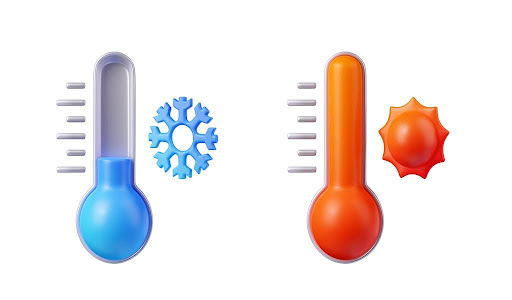One of the common dilemmas when battling a fever is whether to take a hot or cold shower. This question often arises because both temperature extremes can have different effects on the body. Understanding how each option influences fever symptoms can help individuals make informed decisions about their comfort and recovery. This article explores the science behind fevers, the effects of hot and cold showers, and expert recommendations.
 Understanding Fever: The Body's Response to Infection
Understanding Fever: The Body's Response to Infection
A fever is a natural response of the immune system to infection or illness. It typically signifies that the body is fighting off pathogens such as viruses or bacteria. The hypothalamus, a part of the brain, raises the body's temperature as a defense mechanism. While a fever can be uncomfortable, it plays a crucial role in the healing process. The elevated temperature can inhibit the growth of certain pathogens and enhance the efficiency of immune cells, making it an important aspect of the body’s defense strategy.
What Causes a Fever?
Fever can be triggered by various factors, including:
Infections (viral, bacterial, or fungal)
Inflammatory conditions (such as rheumatoid arthritis)
Heat exhaustion
Medications (like antibiotics or vaccines)
Understanding the underlying cause of a fever is essential for determining the best treatment approach. In most cases, fevers are harmless and resolve on their own, but they can be uncomfortable and may require management. For instance, viral infections like the flu or common cold often lead to temporary fevers that can last a few days, while bacterial infections may cause more persistent fevers that necessitate medical intervention.
Additionally, certain autoimmune diseases can lead to recurrent fevers, indicating an ongoing inflammatory process that requires careful monitoring and management.
Symptoms Associated with Fever
Common symptoms accompanying a fever include:
Chills and shivering
Headache
Muscle aches
Fatigue
Dehydration
These symptoms can vary in intensity and duration depending on the individual and the cause of the fever. Managing these symptoms is crucial for overall comfort during illness. For example, staying hydrated is particularly important, as fever can lead to increased fluid loss through sweating and higher metabolic demands.
Additionally, over-the-counter medications such as acetaminophen or ibuprofen can help alleviate discomfort, but it’s essential to consult with a healthcare provider for proper dosing and to ensure that these medications are appropriate for the specific situation. Recognizing the signs of severe illness, such as persistent high fever or accompanying symptoms like rash or difficulty breathing, is vital for timely medical attention.
The Role of Temperature in Fever Management
 When dealing with fever, temperature regulation becomes a key factor. The body's natural response to a rise in temperature is to seek ways to cool down. This is where the decision between a hot or cold shower comes into play. Each option has distinct benefits and potential drawbacks.
When dealing with fever, temperature regulation becomes a key factor. The body's natural response to a rise in temperature is to seek ways to cool down. This is where the decision between a hot or cold shower comes into play. Each option has distinct benefits and potential drawbacks.
Effects of Cold Showers
Cold showers can provide immediate relief from fever symptoms. Here are some benefits:
Cooling Effect: Cold water can help lower the body temperature, providing relief from the heat associated with fever.
Reduced Inflammation: Cold showers may help reduce inflammation and swelling, which can be beneficial in cases of infection.
Improved Circulation: The shock of cold water can stimulate circulation, potentially aiding in the immune response.
However, cold showers may not be suitable for everyone. Some individuals may find them uncomfortable or experience worsening shivering, which can increase body temperature further.
Additionally, those with certain health conditions, such as cardiovascular issues, should approach cold exposure with caution, as the sudden temperature drop can put stress on the heart.
Effects of Hot Showers
Hot showers can also have their advantages during a fever:
Muscle Relaxation: The warmth of a hot shower can help relax tense muscles and alleviate aches associated with fever.
Enhanced Comfort: For some, the soothing sensation of warm water can provide comfort and relaxation, which can be beneficial during illness.
Steam Benefits: Hot showers create steam that can help clear nasal passages, making breathing easier if congestion is present.
Despite these benefits, hot showers can sometimes exacerbate feelings of heat and discomfort, particularly if the fever is high. It's essential to monitor how the body responds to temperature changes.
Moreover, the psychological aspect of warmth can play a significant role; the comforting embrace of a hot shower can provide a mental boost, helping to alleviate feelings of malaise and fatigue that often accompany illness.
However, it's crucial to strike a balance, as prolonged exposure to high temperatures can lead to overheating, which may counteract the intended soothing effects.
Expert Recommendations: What to Choose?
Healthcare professionals often provide guidance on managing fever symptoms. The choice between a hot and cold shower can depend on individual preferences and specific circumstances. Here are some expert recommendations:
When to Choose a Cold Shower
A cold shower may be advisable in the following situations:
If the fever is causing significant discomfort and overheating
When experiencing chills, cold water may help regulate body temperature
If the individual feels overheated and is seeking immediate relief
In these cases, a brief cold shower can provide quick relief. However, it is essential to avoid prolonged exposure to cold, as this can lead to shivering and further increase body temperature.
Additionally, cold showers can invigorate the body, improving circulation and providing a refreshing sensation that can momentarily distract from the discomfort of fever. For those who are particularly sensitive to heat, a cold shower can also serve as a mental reset, helping to alleviate feelings of anxiety that often accompany illness.
When to Choose a Hot Shower
On the other hand, a hot shower may be more beneficial in the following scenarios:
When muscle aches and tension are prominent
If the individual feels chilled but has a fever, warmth can help provide comfort
When seeking to promote relaxation and improve mood during illness
Hot showers should be approached with caution, especially if the fever is high. It's crucial to listen to the body and adjust the water temperature accordingly. The soothing effects of warm water can help ease muscle stiffness and promote better sleep, which is vital for recovery.
Furthermore, the steam generated from a hot shower can help clear nasal passages, providing relief from congestion that often accompanies fever. This dual benefit of physical comfort and respiratory relief can make hot showers a preferred choice for many individuals battling illness.
Additional Fever Management Strategies
 In addition to considering shower temperature, there are other strategies to manage fever effectively. These methods can complement the use of hot or cold showers:
In addition to considering shower temperature, there are other strategies to manage fever effectively. These methods can complement the use of hot or cold showers:
Hydration is Key
Staying hydrated is critical when dealing with a fever. Fever can lead to increased fluid loss, and dehydration can worsen symptoms. Here are some tips:
Drink plenty of water, herbal teas, or clear broths.
Avoid caffeinated beverages, as they can contribute to dehydration.
Consider electrolyte solutions if dehydration is a concern.
Proper hydration supports the immune system and can help regulate body temperature more effectively.
Additionally, incorporating fruits and vegetables with high water content, such as cucumbers, oranges, and watermelon, can further enhance hydration. These foods not only provide essential vitamins and minerals but also help replenish electrolytes lost during fever, making them an excellent choice for recovery.
Rest and Recovery
Rest is vital when the body is fighting off an infection. Adequate sleep and relaxation allow the immune system to function optimally. Here are some recommendations:
Aim for uninterrupted sleep to aid the healing process.
Limit physical activity to conserve energy for recovery.
Create a comfortable environment that promotes rest, such as a cool, dark room.
Prioritizing rest can significantly impact recovery time and overall well-being. Gentle activities such as reading or listening to calming music may also be beneficial, helping to distract from discomfort while still allowing the body to recuperate.
Furthermore, practicing relaxation techniques like deep breathing or meditation can enhance mental clarity and reduce stress, contributing to a more effective healing process.
Over-the-Counter Medications
In some cases, over-the-counter medications can help manage fever symptoms. Common options include:
Acetaminophen: Often recommended for reducing fever and relieving pain.
Ibuprofen: Another option for fever reduction and pain relief.
Aspirin: Generally not recommended for children or teenagers due to the risk of Reye's syndrome.
Always consult with a healthcare professional before starting any medication, especially if there are underlying health conditions or if the fever persists. In addition to these medications, some individuals may find relief through natural remedies such as ginger tea or honey, both of which have anti-inflammatory properties.
However, it's essential to approach these alternatives with caution and ensure they do not interfere with prescribed treatments or existing health conditions.
When to Seek Medical Attention
While most fevers are manageable at home, certain situations warrant medical attention. It's important to recognize when a fever may indicate a more serious condition. Seek medical help if:
The fever is above 103°F (39.4°C) in adults and persists for more than three days.
There are additional concerning symptoms, such as difficulty breathing, chest pain, or severe headaches.
A fever occurs in infants under three months of age.
Timely medical intervention can be crucial in addressing underlying health issues and ensuring appropriate treatment. In addition to the aforementioned symptoms, it is also essential to be vigilant about any sudden changes in behavior or mental status, such as confusion or lethargy, which may indicate a more severe infection or illness. These changes can often accompany high fevers and should not be overlooked.
Furthermore, individuals with pre-existing health conditions, such as heart disease, diabetes, or compromised immune systems, should be particularly cautious. Even a mild fever can escalate quickly and lead to complications for these individuals. Keeping a close watch on any accompanying symptoms and maintaining regular communication with healthcare providers can help manage these risks effectively. Remember, proactive health management is key to preventing more serious outcomes.
Know What’s Right for Your Fever—Talk to Doctronic!
Deciding between a hot or cold shower when experiencing a fever can be challenging. Each option has its benefits and potential drawbacks, and the best choice often depends on individual symptoms and preferences. Cold showers provide immediate cooling relief, while hot showers offer comfort and relaxation. Ultimately, managing fever involves a combination of temperature regulation, hydration, rest, and, when necessary, medical intervention. By understanding how to navigate these options, individuals can better support their recovery and find relief from fever symptoms.
Confused about whether to take a hot or cold shower during a fever? Learn the facts and make informed decisions for faster relief with Doctronic! Empower yourself with knowledge—because your health deserves clarity and care.



 Understanding Fever: The Body's Response to Infection
Understanding Fever: The Body's Response to Infection When dealing with fever, temperature regulation becomes a key factor. The body's natural response to a rise in temperature is to seek ways to cool down. This is where the decision between a hot or cold shower comes into play. Each option has distinct benefits and potential drawbacks.
When dealing with fever, temperature regulation becomes a key factor. The body's natural response to a rise in temperature is to seek ways to cool down. This is where the decision between a hot or cold shower comes into play. Each option has distinct benefits and potential drawbacks. In addition to considering shower temperature, there are other strategies to manage fever effectively. These methods can complement the use of hot or cold showers:
In addition to considering shower temperature, there are other strategies to manage fever effectively. These methods can complement the use of hot or cold showers: